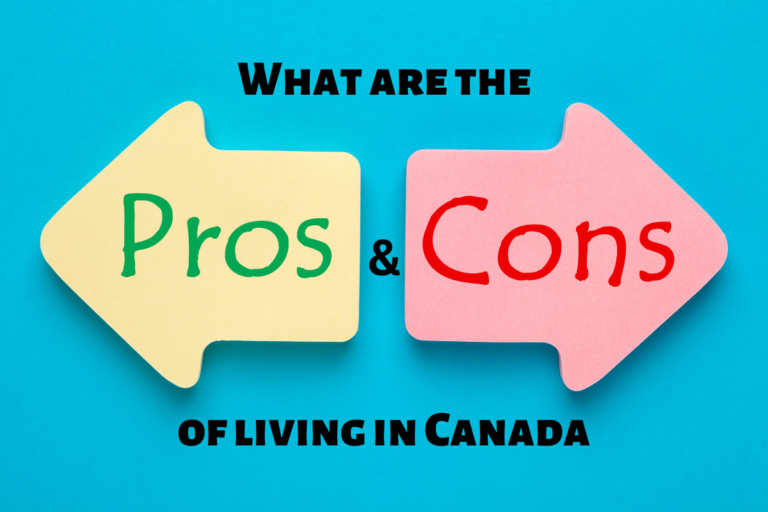Master of Science (MS) in Canada for Pakistani Students 2023
What are the benefits of doing MS in Canada?
There are several benefits of pursuing a Master of Science (MS) degree in Canada, including:
- High-Quality Education: Canada is known for its world-class education system, which is reflected in the quality of its universities and colleges. Canadian universities consistently rank among the top universities in the world.
- Diverse Programs: Canadian universities offer a wide range of MS programs in various fields such as engineering, business, health sciences, social sciences, and more. Students have access to a diverse range of programs and can choose the one that aligns with their interests.
- Research Opportunities: Canada is a hub for research and innovation, and many Canadian universities are at the forefront of research in various fields. Students pursuing an MS in Canada have ample opportunities to participate in research projects and gain hands-on experience.
- Employment Opportunities: Canada has a strong and stable economy, and there is a high demand for skilled workers in various fields. Students who graduate with an MS from a Canadian university have access to excellent employment opportunities in Canada and around the world.
- Multicultural Environment: Canada is known for its welcoming and inclusive environment, and Canadian universities are known for their diverse student body. Students pursuing an MS in Canada have the opportunity to learn and collaborate with students from various cultural backgrounds, which can broaden their horizons and enhance their learning experience.
- Post-Graduation Work Permit: Students who graduate from Canadian universities are eligible for a Post-Graduation Work Permit (PGWP), which allows them to work in Canada for up to three years after graduation. This provides an excellent opportunity to gain valuable work experience in Canada and potentially transition to permanent residency.
Top 10 Universities of Canada to Study Master of Science in Canada
Here are the top 10 universities in Canada to study Master of Science (MS) programs:
- University of Toronto: The University of Toronto is a research-intensive university that offers a wide range of MS programs in fields such as engineering, science, business, and more.
- University of British Columbia: The University of British Columbia is a globally-renowned university that offers excellent MS programs in fields such as engineering, health sciences, and more.
- McGill University: McGill University is one of the oldest universities in Canada and is known for its strong research programs. The university offers a range of MS programs in fields such as science, engineering, and more.
- University of Alberta: The University of Alberta is a top research university that offers a range of MS programs in fields such as science, engineering, business, and more.
- University of Waterloo: The University of Waterloo is known for its strong focus on innovation and entrepreneurship. The university offers a range of MS programs in fields such as science, engineering, and more.
- McMaster University: McMaster University is a research-intensive university that offers a range of MS programs in fields such as science, engineering, health sciences, and more.
- Queen’s University: Queen’s University is known for its strong research programs and offers a range of MS programs in fields such as science, engineering, business, and more.
- University of Calgary: The University of Calgary is a research-intensive university that offers a range of MS programs in fields such as science, engineering, and more.
- Simon Fraser University: Simon Fraser University is a research-focused university that offers a range of MS programs in fields such as science, engineering, and more.
- Western University: Western University is known for its strong research programs and offers a range of MS programs in fields such as science, engineering, business, and more.
Key Research Areas and Top Subjects to Pursue in Canada for MS
Canada is a hub for research and innovation, and there are numerous areas of study in which students can pursue their Master of Science (MS) degree. Here are some key research areas and top subjects to pursue in Canada for MS:
- Engineering: Canada is known for its vital engineering programs, and students can pursue MS programs in areas such as electrical, mechanical, civil, and more.
- Computer Science: Canada is home to some of the world’s leading technology companies, and students can pursue MS programs in areas such as artificial intelligence, machine learning, software engineering, and more.
- Health Sciences: Canada has a robust healthcare system, and students can pursue MS programs in areas such as public health, nursing, epidemiology, and more.
- Natural Sciences: Canada has diverse natural landscapes, and students can pursue MS programs in areas such as biology, chemistry, physics, and more.
- Business: Canada has a strong and stable economy, and students can pursue MS programs in areas such as finance, marketing, entrepreneurship, and more.
- Social Sciences: Canada is a diverse and multicultural country, and students can pursue MS programs in areas such as psychology, sociology, anthropology, and more.
- Environmental Sciences: Canada is committed to environmental sustainability, and students can pursue MS programs in areas such as environmental science, environmental policy, and more.
- Mathematics: Canada has a strong tradition in mathematics, and students can pursue MS programs in areas such as pure mathematics, applied mathematics, and more.
- Architecture: Canada has a diverse and innovative architecture scene, and students can pursue MS programs in areas such as architecture, landscape architecture, and more.
- Education: Canada has a world-renowned education system, and students can pursue MS programs in areas such as curriculum and instruction, educational leadership, and more.
Top Scholarship Schemes in Canada
Canada offers a range of scholarship schemes for international students to help them fund their education. Here are some top scholarship schemes in Canada:
- Canada Graduate Scholarships – Master’s Program (CGS-M): This scholarship is awarded by the Canadian government to high-performing students pursuing a Master’s degree. The scholarship provides up to $17,500 per year for one or two years.
- Vanier Canada Graduate Scholarships: The Vanier Scholarship is awarded by the Canadian government to doctoral students pursuing their studies in fields such as engineering, natural sciences, social sciences, and more. The scholarship provides up to $50,000 per year for three years.
- Ontario Graduate Scholarship (OGS): The Ontario Graduate Scholarship is awarded by the Ontario government to high-performing students pursuing graduate studies in Ontario. The scholarship provides up to $15,000 per year for one or two years.
- Trudeau Foundation Scholarships: The Trudeau Foundation Scholarship is awarded to doctoral students pursuing their studies in fields such as social sciences, humanities, and more. The scholarship provides up to $40,000 per year for three years.
- Mitacs Globalink Research Award: The Mitacs Globalink Research Award is a research-based scholarship that provides funding for international students to conduct research in Canada. The scholarship provides up to $6,000 for research expenses.
- Ontario Trillium Scholarship (OTS): The Ontario Trillium Scholarship is awarded by the Ontario government to international Ph.D. students pursuing their studies in Ontario. The scholarship provides up to $40,000 per year for four years.
- Lester B. Pearson International Scholarship: The Lester B. Pearson International Scholarship is awarded by the University of Toronto to international students pursuing undergraduate studies. The scholarship provides up to $15,000 per year for four years.
- Pierre Elliott Trudeau Foundation Scholarship: The Pierre Elliott Trudeau Foundation Scholarship is awarded to doctoral students pursuing their studies in fields such as social sciences, humanities, and more. The scholarship provides up to $40,000 per year for three years.
- Canadian Queen Elizabeth II Diamond Jubilee Scholarships: The Canadian Queen Elizabeth II Diamond Jubilee Scholarships are awarded to international students pursuing studies in Canada. The scholarship provides up to $10,000 for tuition and other expenses.
- Humber College International Entrance Scholarships: The Humber College International Entrance Scholarships are awarded to international students pursuing undergraduate or graduate studies at Humber College. The scholarship provides up to $3,000 for tuition and other expenses.
Process of Application for Master of Science in Canada
The application process for Master of Science (MS) programs in Canada can vary from university to university, but here are some general steps to give you an idea of what to expect:
- Research universities and programs: Start by researching universities and MS programs that interest you. Consider factors such as program requirements, research opportunities, location, and funding options.
- Meet the admission requirements: Check the admission requirements for the MS program you’re interested in. Typically, you will need a bachelor’s degree in a related field with a minimum GPA requirement, and you may need to submit standardized test scores such as the GRE or GMAT.
- Gather required documents: Gather the necessary documents such as transcripts, letters of recommendation, resume/CV, and statement of purpose. Some universities may require additional documents, so make sure to check the specific requirements for each program.
- Apply online: Most universities have an online application system. Create an account, fill out the application form, and upload your required documents.
- Pay the application fee: There is usually an application fee that you will need to pay when submitting your application. The fee can vary from university to university.
- Follow up: After you’ve submitted your application, you may need to follow up with the university to make sure that they’ve received all your documents and that your application is complete.
- Wait for a decision: The time it takes for universities to make a decision can vary, but most will notify you within a few months. If you are accepted, the university will send you an offer letter outlining the terms of admission.
- Accept the offer and apply for a study permit: If you decide to accept the offer, you will need to apply for a study permit. This is a document that allows you to study in Canada for the duration of your program.
- Plan for your arrival: Once you’ve been accepted and have your study permit, you can start planning for your arrival in Canada. This includes finding housing, arranging transportation, and more.
It’s important to note that the application process can be complex, so it’s recommended that you start early and give yourself plenty of time to complete all the necessary steps.
What are the eligibility criteria for studying MS in Canada?
The eligibility criteria for studying MS in Canada can vary depending on the university and program, but here are some general requirements that most universities will consider:
- Academic qualifications: To be eligible for an MS program, you will typically need a bachelor’s degree in a related field with a minimum GPA requirement. The specific GPA requirement can vary from program to program.
- English language proficiency: International students may need to provide proof of English language proficiency through standardized tests such as TOEFL or IELTS. The required minimum score can vary from university to university.
- Standardized test scores: Some MS programs may require standardized test scores such as the GRE or GMAT. The specific test requirements can vary from program to program.
- Letters of recommendation: Most MS programs require letters of recommendation from academic or professional references.
- Statement of purpose: A statement of purpose is typically required as part of the application process. This is a document that outlines your academic and professional background, research interests, and career goals.
- Work experience: Some MS programs may require work experience in a related field.
- Other requirements: Some MS programs may have additional requirements such as a portfolio or writing sample, or an interview with the admissions committee.
It’s important to note that the eligibility criteria can vary from program to program, so it’s recommended that you check the specific requirements for each program you’re interested in before applying.
Is SOP required for applying to Canadian Universities?
Yes, A Statement of Purpose (SOP) is typically required for applying to Master of Science (MS) programs in Canadian universities. The SOP is a document that outlines your academic and professional background, research interests, and career goals. It gives you an opportunity to explain why you are interested in the program and how it will help you achieve your goals.
The SOP is an important part of the application process and can help the admissions committee get a better understanding of your qualifications and motivations for pursuing the program. It’s important to make sure that your SOP is well-written and tailored specifically to the program you are applying to. You should take the time to research the program and the faculty members to identify specific research interests that align with your own and explain how the program will help you achieve your career goals.
Make sure to carefully review the application requirements for each program you are applying to, as the specific requirements for the SOP can vary from program to program. Some universities may have specific prompts or questions that they want you to address in your SOP, while others may provide more general guidelines. Regardless of the specific requirements, it’s important to make sure that your SOP is well-written, persuasive, and makes a strong case for why you are a good fit for the program.
What should be your minimum score in Bachelor’s to get admission to Masters’s in Canada?
The minimum score required in a bachelor’s degree to get admission to a Master’s program in Canada can vary depending on the university and the specific program. Generally, most universities require a minimum of a “B” average or a GPA of 3.0 (out of 4.0) for your bachelor’s degree. However, some programs may have higher GPA requirements, while others may have lower requirements.
It’s important to note that the GPA requirement is just one of several factors that universities consider when evaluating applicants for admission. Other factors such as test scores (such as GRE or GMAT), letters of recommendation, statement of purpose, work experience, and research experience may also be taken into account. Additionally, some universities may have different GPA requirements for international students compared to Canadian students.
To determine the specific GPA requirement for the Master’s program you are interested in, you should check the program’s admission requirements on the university’s website or contact the program directly for more information. It’s also a good idea to aim for a higher GPA than the minimum requirement to increase your chances of being admitted to the program.
How much does an MS cost in Canada?
The cost of an MS (Master of Science) degree in Canada can vary depending on the university, the program, and whether you are a domestic or international student. Generally speaking, international students will pay more in tuition fees than domestic students.
As an estimate, the average cost of tuition fees for an MS program in Canada for international students can range from CAD $17,000 to CAD $35,000 per year, while for domestic students, it can range from CAD $5,000 to CAD $15,000 per year. However, it’s important to note that these costs are approximate and can vary significantly depending on the specific program and institution.
Additionally, it’s important to factor in the cost of living expenses, such as accommodation, food, and transportation, which can also vary depending on the location of the university and your personal lifestyle.
Conclusion
In conclusion, pursuing a Master of Science degree in Canada can offer many benefits such as access to world-class universities, a diverse and welcoming culture, and opportunities to work and live in Canada after graduation. Some of the top universities in Canada for Master of Science programs include the University of Toronto, McGill University, and the University of British Columbia.
To apply for a Master of Science program in Canada, you will need to meet the eligibility criteria set by the university, which typically include academic qualifications, English language proficiency, standardized test scores, letters of recommendation, a statement of purpose, and sometimes work experience or other requirements. It’s important to carefully review the admission requirements for each program you are interested in to ensure that you meet the minimum requirements and to tailor your application materials to the specific program.
There are also various scholarship schemes available for international students to help fund their studies in Canada. These include scholarships from the Canadian government, universities, and private organizations. By researching and applying for these scholarships, you can potentially reduce the financial burden of pursuing a Master of Science degree in Canada.
Overall, pursuing a Master of Science degree in Canada can be a rewarding experience that can open up new opportunities for your career and personal growth.




